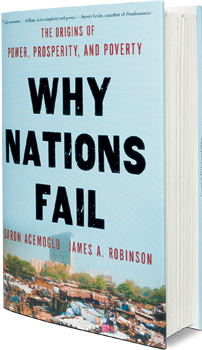Book Review: Why Nations Fail: The Origins of Power, Prosperity, and Poverty
- Written by Admin TOA
- Published in Culture & Art
 Somewhere in Beijing there must be an incinerator for burning reports from outsiders telling China’s leaders what to do. In February the World Bank, in cooperation with an arm of the Chinese government, issued a report called China 2030 that included this gem: “Where contract disputes arise … the disputants should have access not only to legal recourse but also to a transparent and effective judicial system that imparts justice without fear or favor.” It’s hard to imagine President Hu Jintao slapping his forehead in wonderment upon reading this: “But of course! Why didn’t we think of that? Stop the theft of intellectual property at once!”
Somewhere in Beijing there must be an incinerator for burning reports from outsiders telling China’s leaders what to do. In February the World Bank, in cooperation with an arm of the Chinese government, issued a report called China 2030 that included this gem: “Where contract disputes arise … the disputants should have access not only to legal recourse but also to a transparent and effective judicial system that imparts justice without fear or favor.” It’s hard to imagine President Hu Jintao slapping his forehead in wonderment upon reading this: “But of course! Why didn’t we think of that? Stop the theft of intellectual property at once!”As silly as it is, the “ignorance hypothesis”—the assumption that people in power would do right by their citizens if only they knew better—“still rules supreme among most economists and in Western policy-making circles,” Massachusetts Institute of Technology economist Daron Acemoglu and Harvard University political scientist James Robinson write in their new book, Why Nations Fail: The Origins of Power, Prosperity, and Poverty. Nations fail, the authors argue, because “those who have power make choices that create poverty. They get it wrong not by mistake or ignorance but on purpose.” For the brutal few, hanging on to power and wealth outweighs all else.
Creative destruction, the driving force of modernization, terrifies those in power—and almost always has. In 1589, Queen Elizabeth I rejected the request of one William Lee for a patent on a knitting machine. “Thou aimest high, Mister Lee,” she told him. “Consider thou what the invention could do to my poor subjects. It would assuredly bring to them ruin by depriving them of employment, thus making them beggars.” What really worried Elizabeth, the authors say, was that the labor-saving technology would be politically destabilizing “and threaten royal power.”
Ranging from imperial Rome to modern Botswana, this book will change the way people think about the wealth and poverty of nations. The authors’ second book together is as ambitious as Jared Diamond’s Guns, Germs, and Steel: The Fates of Human Societies yet draws different lessons from history. The authors say Diamond’s geographic determinism, which argues countries got ahead based on their natural endowments, can’t explain why, for example, Peru has remained poor despite getting access to the wheat, barley, and horses that gave Spaniards an early edge. (Despite the criticism, Diamond supplied an enthusiastic blurb for the back cover of Why Nations Fail.) Source: By Peter Coy - Bloomberg Businessweek
(By Daron Acemoglu and James Robinson, Crown Business; 544pp; $30)
Ranging from imperial Rome to modern Botswana, this book will change the way people think about the wealth and poverty of nations. The authors’ second book together is as ambitious as Jared Diamond’s Guns, Germs, and Steel: The Fates of Human Societies yet draws different lessons from history. The authors say Diamond’s geographic determinism, which argues countries got ahead based on their natural endowments, can’t explain why, for example, Peru has remained poor despite getting access to the wheat, barley, and horses that gave Spaniards an early edge. (Despite the criticism, Diamond supplied an enthusiastic blurb for the back cover of Why Nations Fail.) Source: By Peter Coy - Bloomberg Businessweek
(By Daron Acemoglu and James Robinson, Crown Business; 544pp; $30)
Last modified onSaturday, 06 May 2017 10:07
Latest from Admin TOA
- 300 migrants to be housed at shuttered Catholic church on Northwest Side in Chicago
- Turkish Stand-Up Sensation Hasan Can Kaya Embarks on U.S. Tour with Art Evi Production, in212 Production, and TAAS New York
- "Lean Startup, To Lean Company, To Rich Exit" by Dr. Kenan Sahin is released with Forbes Books
- LOSEV USA Ramadan Campaign Let the Children Heal First with Your Ramadan Donations
- Azerbaijan Society of America Honors Centennial Anniversary of the Great Azerbaijani Politician the National Leader of Azerbaijan President Heydar Aliyev
